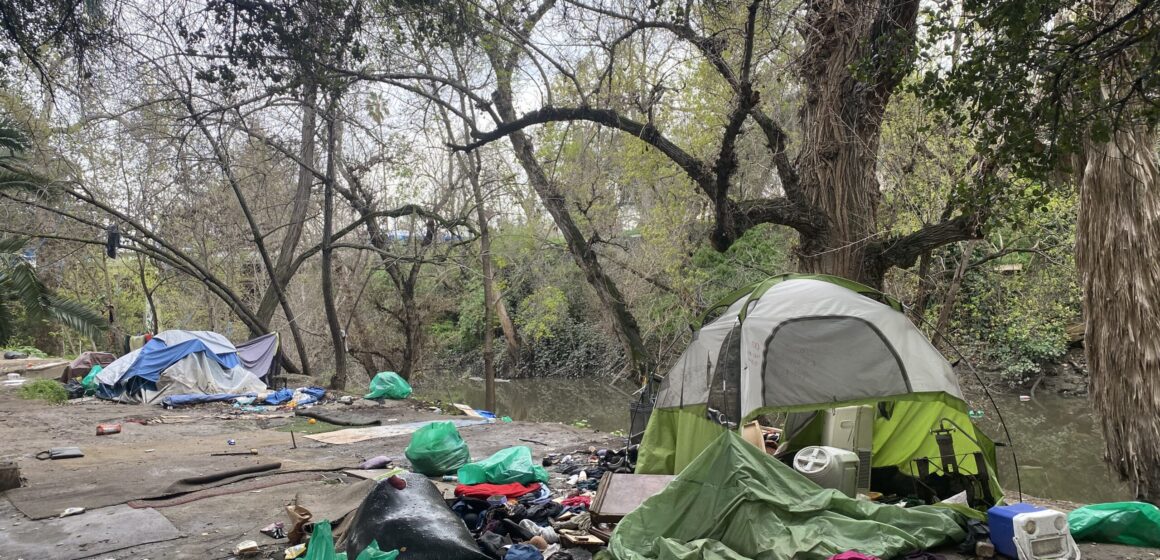It’s been over a year since the state ordered San Jose to improve the way it collects and displays data on its homeless services, but the city still has work to do.
A 2024 state audit released last April gave the city seven recommendations to improve how it tracks expenses and measures effectiveness for its homeless services. The deadline was September 2024. The city has met two of those goals and is behind on five.
The two recommendations fully implemented include asking the city to set more robust annual goals that are now provided in the Consolidated Annual Homelessness Report, which combines information from multiple city departments to provide a comprehensive overview of homelessness. The other is better monitoring of temporary housing utilization through the city’s new homeless data dashboard.
Of the five goals still being worked on, three are pending assessment from the California State Auditor. These include recommendations to set a goal for the construction of permanent housing, collecting and analyzing demographic data on homelessness and establishing and tracking performance metrics applied to supporting nonprofits — a growing concern countywide.
Two recommendations have been labeled “partially implemented.” Those are a recommendation to measure the effectiveness of the city’s public health and safety programs for unsheltered people and publicly reporting the city’s finances related to homelessness.
While the city did publish a report on its spending, the auditor’s office noted the report does not elaborate on its funding sources, including federal and state grants.
Sarah Fields, spokesperson for the city’s housing department, said the city’s stance is that all seven recommendations have been fully implemented. She added the city has seen positive trends, such as a reduction in unsheltered homelessness between 2023 and 2025, which coincide with the city’s focus on expanding temporary shelter options and homelessness prevention.
“The state audit identified areas for improvement, which the city of San Jose respects,” Fields told San José Spotlight. “We continue to emphasize the broader context: factors like income inequality and limited affordable housing capacity persist.”
San Jose has 6,503 homeless residents according to a point-in-time count conducted in January, though advocates said some worry this is most likely an undercount. There are about 2,989 temporary shelter beds in San Jose.
There are 3,959 unsheltered people in San Jose, according to the 2025 point-in-time count, which is down 10% from 2023. Mayor Matt Mahan said the decrease can be attributed to the city’s work expanding temporary shelter options, including its goal to add about 1,400 shelter beds this year. Hundreds of those beds have already opened at four sites, including safe parking for people living in vehicles.
“The audit made clear what we’ve long known — we need more shelter, more services and more accountability,” Mahan told San José Spotlight. “Too many people are still suffering because the systems meant to help them — especially our public health and justice systems — aren’t acting with the urgency this crisis demands.”
To meet temporary shelter goals, the city council diverted about 90%, or $39.2 million, of this year’s Measure E revenue, which was approved by voters to fund the construction of permanent affordable housing.
While the audit has put San Jose’s homeless support systems under a microscope, state Sen. Dave Cortese said the results could be applied across the state, not just locally. Another report from the state auditor’s office, also published April 2024, found that the state has not adequately tracked the effectiveness of its homeless spending.
“It wasn’t ever intended to be a ‘gotcha’ type of thing,” Cortese told San José Spotlight. “We should all be trying to resolve that, all of us. Legislators, mayors, county supervisors, we all need to be on the same team on that.”
He wants a public hearing about the audit to discuss the findings and implementation of the recommendations made by San Jose and San Diego, the second city audited. He said a public hearing would allow residents to learn about the obstacles auditors faced, and allow advocates and officials to brainstorm possible solutions.

Cortese said he’s discussed the possibility of a hearing with other legislators, whether the audit would be heard by the Joint Committee on Legislative Audits or the Senate Housing Committee, both of which he serves on.
“I have not run into any elected official in Sacramento who is satisfied with the results we’re getting from the investments we’ve already made,” Cortese told San José Spotlight. “The big cities have continually said the problem is you’re not sending us enough money. … But an excess of $20 billion is a lot of money.”
Contact B. Sakura Cannestra at [email protected] or @SakuCannestra on X.



Leave a Reply
You must be logged in to post a comment.